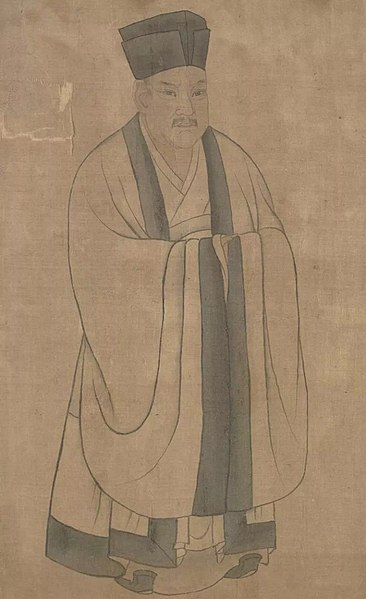Hello ladies and gents this is the Viking telling you that today we are talking about
Qin Hui
Qin Hui or Qin Kuai (January 17, 1090 – November 18, 1155) was a Chinese politician. He was a Chancellor of the Song dynasty in Chinese history.
He was a contemporary of Yue Fei during the reign of Emperor Gaozong of Song. Modern historians have blamed Emperor Gaozong Zhao Gou for being a traitor for his part in the persecution and execution of his political enemy, Yue Fei, a general who fought for the Song against the Jin dynasty during the Jin–Song Wars.
Born in Jiangning (present days Nanjing, Jiangsu), Qin won Jinshi in the Imperial examination of 1115. During the Northern Song dynasty, Qin was an activist against the invasion by the Jin dynasty in the Jin–Song Wars. He was captured along with Emperor Qinzong and Emperor Huizong in the Jingkang Incident.
Some years later, he suddenly returned from captivity in the Jin empire to the capital of Emperor Gaozong. He claimed some sort of miraculous escape but quite some people expressed doubt regarding his story. However, he quickly won the emperor's favor and became the Chancellor of the Southern Song empire in 1131. In the next year, he was removed from the position after impeachment. After some Song victories in 1137, the Jin empire was forced to reopen peace talks, and Qin gained power as a pacifist.
With Qin's help, the emperor suppressed the war hawks and signed the Treaty of Shaoxing with the Jin empire. The emperor basically accepted the status of being a vassal of the Jin empire publicly. To open the peace talks, the national hero general Yue Fei, who was famous for his military successes against the Jurchen people, was framed by Qin and his accomplices for disobedience and treason.
Yue was soon removed from his position, arrested and executed in prison. Murdering Yue Fei is one of the most infamous evil acts by a government minister in the whole history of the Song dynasty. Qin became notorious, and (after he lost power and died) some people suspected that he was a traitor.
Qin removed all his political opponents from the government by use of his control over the Imperial Censorate. Most of his enemies were exiled far to the south, several in fact died on Hainan Island. He believed that schools should only teach "acceptable ideas" and practiced a strong form of censorship and thought control over the Imperial University.
After Emperor Gaozong's resignation, the new Emperor Xiaozong of Song pardoned most of Qin's political enemies, including a posthumous pardon for Yue Fei. From that point on, Qin was constantly vilified by Chinese historians. He became one of the most important examples in Chinese history of an evil minister.
Story of Qin Hui and Yue Fei
The Story of Yue Fei states that after having Yue Fei, Yue Yun, and Zhang Xian arrested on false charges, Qin and his wife, Lady Wang (Chinese: 王氏), were sitting by the "eastern window", warming themselves by the fire, when he received a letter from the people calling for the release of the general. Qin was worried because, after nearly two months of torture, he could not get Yue Fei to admit the false charges of treason and would eventually have to let him go.
However, after a servant girl brought fresh oranges into the room, Lady Wang devised a plan to execute the general. She told Qin to slip an execution notice inside the skin of an orange and send it to the examining judge. This way, the general and his companions would be put to death before the Emperor or Qin himself would have to rescind an open order of execution. This conspiracy became known as the “East-Window Plot”. An anonymous novel was written about this called the Dong Chuang Ji ("Tale of the Eastern Window") during the Ming dynasty.
When asked by General Han Shizhong what crime Yue had committed, Qin Hui replied, "Though it isn't sure whether there is something that he did to betray the dynasty, maybe there is.” The phrase "unneeded" (simplified Chinese: 莫须有; traditional Chinese: 莫須有; pinyin: mò xū yǒu) has entered the Chinese language as an expression to refer to fabricated charges.
For their part in Yue Fei's death, iron statues of Qin Hui, Lady Wang, and two of Qin Hui's subordinates, Moqi Xie and Zhang Jun (Chinese: 張俊), were made to kneel before Yue Fei's tomb (located by Hangzhou's West Lake). For centuries, these statues have been cursed, spat and urinated upon by young and old. But now, in modern times, these statues are protected as historical relics. There is a poem hanging on the gate surrounding the statues, it reads:
"The green hill is fortunate to be the burial ground of a loyal general, the white iron was innocent to be cast into the statues of traitors."
The story of Qin and his wife are also said to be the origin of Youtiao and as always have a chilled day from the Viking

Comments
Post a Comment